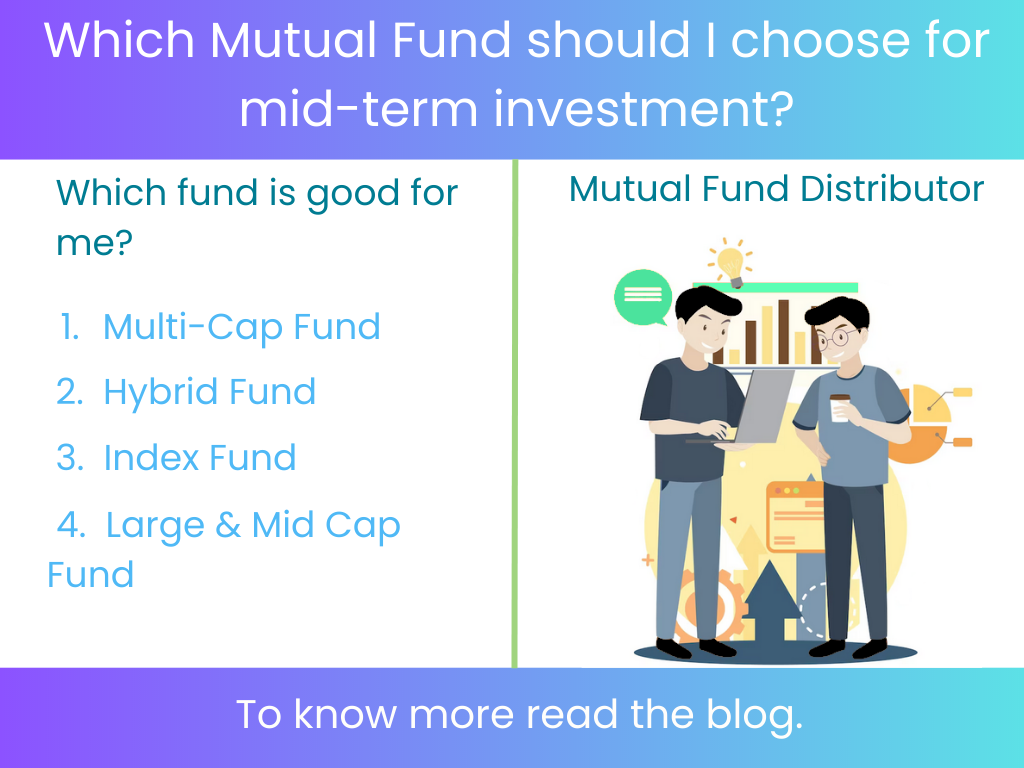Which Mutual Fund should I choose for mid-term investment?
Choosing the right mutual fund for mid-term investment requires considering a few key factors, such as your investment goals, risk tolerance, and investment horizon. Here are a few suggestions for mutual funds that you could consider for mid-term investment:
Look for mid-cap funds: Mid-cap mutual funds invest primarily in companies with medium market capitalization. These companies have the potential to grow faster than large-cap companies but may be riskier than small-cap companies.
Consider the fund's track record: Look at the fund's historical performance over the past few years, as well as its performance during different market cycles. A mutual fund with a consistent track record of outperforming its benchmark index could be a good choice.
Check the fund's expense ratio: The expense ratio is the fee charged by the mutual fund company to manage the fund. Look for funds with a lower expense ratio, as this will have a direct impact on your returns.
Analyze the fund's portfolio: Check the fund's portfolio to see if it aligns with your investment goals and risk tolerance. For instance, if you are looking for a moderate level of risk, you may want to look for funds with a mix of stocks and bonds.
Look for a fund with a good fund manager: A good fund manager can make a significant difference in a fund's performance. Look for funds managed by experienced and successful fund managers who have a good track record of managing funds.
Some mutual funds that you could consider for mid-term investment include :
Multi-Cap Fund: Multi-cap funds invest in stocks of companies of different market capitalization (large-cap, mid-cap, and small-cap). These funds offer a good balance of risk and return and are suitable for investors with a moderate risk appetite. They have the potential to deliver higher returns than large-cap funds over the long term.
Hybrid Fund: Hybrid funds invest in a mix of equity and debt instruments. They offer the potential for higher returns than debt funds while also providing some cushion against market volatility. These funds are suitable for investors with a moderate risk appetite and a mid-term investment horizon.
Large & Mid Cap Fund: Large & Mid Cap funds invest in both large-cap and mid-cap companies. These funds offer a good blend of stability and growth potential and are suitable for investors with a moderately high risk appetite. They can be a good option for investors looking to build a diversified portfolio with exposure to both large and mid-cap companies.
Value Fund: Value funds invest in stocks that are currently undervalued by the market but have the potential for growth in the future. These funds offer the potential for higher returns but can be riskier than other types of funds. They are suitable for investors with a high risk appetite and a long-term investment horizon.
Index Fund: Index funds are passively managed funds that invest in stocks that are part of a particular index (such as the Nifty 50 or the BSE Sensex). These funds offer low costs and provide returns that are similar to the performance of the index they track. They are suitable for investors looking for a low-risk, low-cost investment option.
It's important to note that the choice of mutual fund ultimately depends on your investment goals, risk tolerance, and investment horizon. Therefore, it is recommended to consult with a financial advisor before making any investment decisions.


